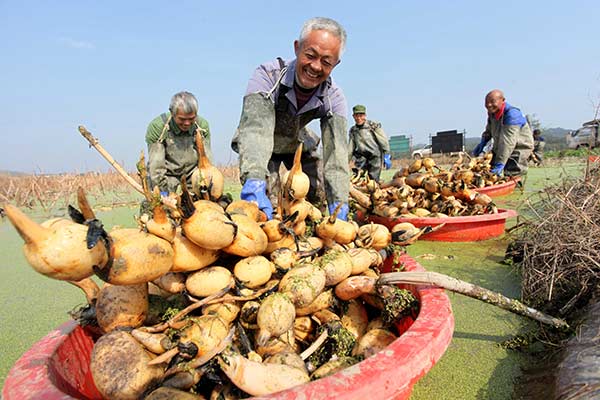Agricultural reform key to China's prosperity
 |
|
Farmers harvest lotus roots in Wenxi, Jiangxi province. The village has a lotus root farm covering some 33 hectares. The government of Dongxiang county, where the village is located, helped start the farm, a poverty-alleviation project meant to increase local incomes. [Photo/China Daily] |
BEIJING - China's first central document of 2017 promises to maintain the drive to resolve rural issues on the road to a moderately prosperous society by 2020.
The Central Committee of the Communist Party of China and the State Council released a document on supply-side structural reform in the agriculture sector on Sunday.
The first policy statement of year is widely referred to as the "No 1 Central Document." For the past 14 years, it has been devoted to agriculture, farmers and rural areas.
Rural areas should make greater strides toward a moderately well-off society by raising agricultural efficiency and farmers' incomes, and promoting green production, the document said.
"China's countryside should be a fascinating place. Agriculture is an attractive sector and farming should be an admirable occupation," said Tang Renjian, deputy director of the central rural work leading group.
Urban-rural divide
Building the kind of moderately prosperous society China's leaders envisage by 2020 means doubling 2010 GDP and residents' incomes, while lifting the whole population above the poverty line.
The urban-rural income gap continued to narrow last year, with per capita disposable income of rural residents rising 6.2 percent compared to only 5.6 percent among the urban population, according to the National Bureau of Statistics. The gap remains considerable however, with the per capita income of urbanites 2.72 times more than that of their rural counterpart.
This disparity was highlighted in the document, with "continuing weak growth in the incomes of agricultural workers" listed as one of the prime issues to be addressed through supply-side structural reform.
A better deal for farmers, along with ensuring food security,?is central to the planned reform, Tang said.
Security of supply
During the reform process, it is imperative that national grain security be guaranteed, according to the document. Output dropped slightly in 2016, ending a 12-year rising streak, but still the second highest year on record.
China has entered a stage of rapidly rising customer expectations. Consumers want their food to be of high quality and they seek greater choice. As Tang said, the basic objective of agricultural reform is to provide safe, edible food.
In pursuit of safer, more sustainable, higher quality products, there must be no increase in use of pesticides and fertilizers. Better quality-control and more systematic production will ensure the safety of produce.
A chain of innovation centers will be created, and clean production that uses less water will be promoted and polluted soil be rehabilitated.
Better prospects
Little can be achieved without financial support and professional expertise.
Fiscal support for agriculture and rural areas should show moderate growth and loans will be made easier to obtain, according to the document.
Public private partnerships, subsidies and special rural development funds are just some of the ways the government will encourage investment, Tang said.
Migrant workers will be encouraged to return home and start their own businesses. Careers in agriculture will be made more attractive through professional training for farmers and managers. There will be incentives for college graduates, entrepreneurs and returned students from overseas to bringing their technological and managerial skills to rural areas.
If the right people can be attracted to start businesses in the countryside, it will lead to the fast development of new industries and new ways of making money, according to Tang.























